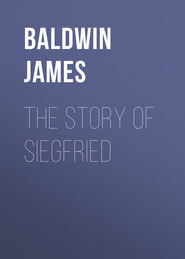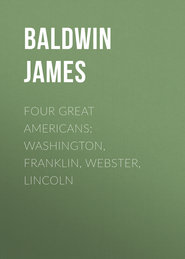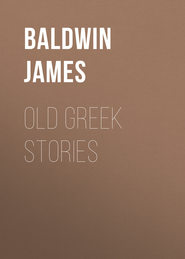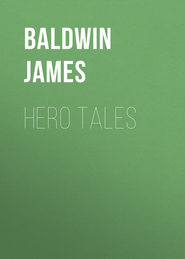По всем вопросам обращайтесь на: info@litportal.ru
(©) 2003-2024.
✖
A Story of the Golden Age
Настройки чтения
Размер шрифта
Высота строк
Поля
"My good friends, I like neither the one plan nor the other. It is but the part of a slave to suffer wrong without striking back. It is but the part of a coward to strike in the dark, as if fearing the enemy's face. Why not send boldly to Messene, and demand either the stolen sheep, or a fair price for them? I myself will undertake the business, and I promise you that I will bring back to Ithaca gifts and goods worth twice as much as the flock that has been taken."
The elders listened with favor to the young man's words; and, after further talk, it was settled that he should go forthwith across the sea to claim the debt which was due from the people of Messene.
The goodliest ship of all the Ithacan galleys was made ready for Odysseus. The needed stores of food and drink were brought on board, and placed in the vessel's hold. The young hero, with his friend and tutor Phemius, climbed over the vessel's side, and sat down in the prow. The long-haired seamen cast loose the moorings; they plied their oars, and the swift ship was soon far out upon the waters. A steady north wind filled the sail, and the vessel sped swiftly on her way, cleaving the white foam with her keel. By and by the sun went down, and night wrapped the world in her sober mantle; but the ship still held its course, being guided by the moon's pale light, and the steadfast star of the north.
The next day they sailed within sight of the low-lying coast of Elis, which stretched northward and southward farther than their eyes could reach. Yet they turned not to the shore, but sailed straight on; for Odysseus, advised by Pallas Athené, wished first to visit Pylos, where wise old Nestor ruled with his father, the ancient Neleus. This Neleus was the uncle of Jason, chief of the Argonauts, and had been driven from Iolcos by Pelias the usurper. Long time had he wandered, an exile in strange lands, until Aphareus of Arene gave him leave to build a city on the sandy plain close by the sea. There he had reared a noble palace; and there he still dwelt, having outlived three generations of men. But he had given up his kingdom, many years before, to his son Nestor, himself a sage old man.
It was not until late on the third day that the voyagers turned their ship's prow into the harbor of Pylos. It touched the shore, and Odysseus with his tutor sprang out upon the sands. They found the people of the city offering sacrifices there to Poseidon, ruler of the deep. Upon nine long seats they were sitting, five hundred or more on each seat; and the priest stood up before them, pouring out libations and offering sacrifices. Nine coal-black heifers he offered to Poseidon.
King Nestor sat upon a lofty seat while the elders of the city stood around him, or plied their several duties at the feast. Some of them were busy cutting choice bits of flesh from the slaughtered beeves; others fixed these bits upon spits, and roasted them over heaps of glowing coals; and still others handed the smoking food to the waiting people who sat hungry in their places. When Nestor saw Odysseus and the bard, two strangers, standing upon the shore, he arose and went down to meet them. He gave to each a hand, and leading them to the feast he seated them upon soft skins spread on piles of yielding sand. Then he brought to them, in his own hands, choicest pieces of well-cooked and well-flavored food; and when they had eaten as much as they liked, he poured rich wine into a golden goblet, and as he offered it first to the noble bard, he said, "Right welcome are you, stranger, whoever you may be, to this our midsummer festival. I give this golden goblet to you first, you being the older man, that you may pray as beseemeth you to great Poseidon. When you have made your prayer, hand then the cup to the young man who is with you, that he too may pour out a libation; for all men have need to pray."
Then the bard took the goblet, and pouring out a rich libation, lifted up his eyes and prayed, "Great Poseidon, thou who dost hold the earth in thy strong arms, hear now the prayer of thy suppliant. Prolong still the life of our aged host, and add to Nestor with each circling year new honors and greater wealth. To the folk of Pylos give rich contentment and that peace which is the befitting prize of those who are mindful of life's varied duties. And lastly, grant that this young man may find that which he seeks, and then return rejoicing to his home and friends."
When he had thus spoken, he gave the goblet to Odysseus, and he in like manner poured out libations, and prayed to great Poseidon.
Then said Nestor as he took again the goblet, "Strangers, you do wisely thus to offer prayers to the gods; for they are far above us in virtue, strength, and honor. When men have failed to do aright, and have broken Heaven's just laws, they may still, by humble vows and supplications, turn aside from evil-doing, and soften the wrath of the ever-living powers."
"Yes, truly," answered Phemius, "by prayers we do honor both ourselves and those to whom we pray. There is an ancient saying, which no doubt you oft have heard, that prayers are the feeble-sighted daughters of Father Zeus, and wrinkled and lame they follow in misfortune's track. But misfortune, strong and swift, out-runs them often, and brings distress upon the sons of men; then these blessed prayers, following after, kindly heal the hurts and bind up the aching wounds which have been made. And for this reason the man who is wont to pray feels less the strokes of fortune than does he who lives forgetful of the gods."[14 - See Note 10 (#note_10) at the end of this volume.]
The feast being soon ended, Nestor turned again to the strangers, and said, "Behold now, the day is well-nigh gone, and all have paid their vows to the ever-living gods. The time has come when we may ask our stranger-guests their names and errand. Who are you who come thus unheralded to the sandy shores of Pylos? Is your visit one of peace, and shall we welcome you as friends? Or do you come as spies, to find out what there may be of wealth or of weakness in our city?"
Odysseus answered: "O noble Nestor, we will speak the truth, and hide nothing from you. I am Odysseus of Ithaca; my father is King Laertes, who was once your comrade when you sailed on the Argo to golden Colchis. Ten days ago, there came to our island seafaring men from Messene, whom we welcomed as friends and neighbors. But under cover of the night they landed on our shores; they seized three hundred of our long-wooled sheep, together with the shepherds, and bore them across the sea to some one of the pirate harbors of Messene. I now am on my way to King Orsilochus, to bid him send back the stolen flock; and if he will not hearken to my words, then I shall either gain by guile or take by force double the value of the sheep. But I have come first to Pylos, that you, my father's old-time friend, might know my errand, and, if need be, lend me your aid."
"You have spoken well," answered Nestor; "and for your father's sake you are thrice welcome to the lofty halls of Pylos. Abide with me for one night, and in the morning I will give you a car and steeds, and a trustworthy guide, to take you by the straightest road to Pherae, where the king of Messene dwells. Orsilochus must learn from me, that, though his pirate-crews may plunder foreign shores, they must not molest the flocks and goods of our home-staying neighbors."
Having thus spoken, he led the way to the fair palace, which his father Neleus erstwhile had built. There they found that aged chieftain sitting in the great hall, upon a soft couch spread with purple coverings. His hair and his long beard were white as the driven snow, and his hands trembled from very feebleness, for he was exceeding old. He spoke kindly to Odysseus, and asked many questions about his father Laertes, and his home in Ithaca; but he seemed most pleased when the young man told him of his visit, when a boy, to Iolcos and Mount Pelion. For Iolcos had been the home of Neleus in his youth; and he it was who had helped Pelias drive Æson from the kingdom which was his by right. But Nemesis had followed him, and punished him for the deed.
Soon the shades of night began to darken the fair hall, and the chiefs and elders went each one to his own house. But Nestor led Odysseus and the bard to an upper chamber, where a fair, soft couch was spread upon a jointed bedstead. There he left them for the night, and there they soon found rest in soothing slumber.
As soon as the light of day began to streak the eastern sky, the aged Neleus, as was his wont, arose from his couch, and, leaning on the arm of Nestor, went feebly out, and took his seat upon a smooth white stone before the palace gate. Then every one who had aught of grievance, or had suffered any wrong, came and told his story, and made his plea; and the old hero weighed the matter with an even hand, and gave judgment for the right.
"What shall be done to aid the son of Laertes, that so his journey into Messene shall prosper?" asked Nestor. "Thou knowest that King Orsilochus has ever been our friend and ally; yet shall we allow his lawless men thus to despoil our neighbors and old-time comrades?"
"Send to Pherae, with the young man, a trusty messenger who shall speak for him," answered old Neleus. "Send them both in thy own chariot, and ask Orsilochus, in the name of a friend, to deal justly with the son of Laertes."
By this time Odysseus and the bard had awakened from their slumber. They arose; and when they had bathed, and had been anointed with soft oil, they clothed themselves in robes of noble texture, and went down into the banquet hall. There they found King Nestor waiting; and they sat down with him at the table, and willing servants waited on them, bringing choice food and pouring sweet wine into golden goblets.
When the meal was finished, the bard bade his host farewell; and, praying that the gods would speed Odysseus on his errand, he went down to the red-prowed ship which was waiting by the shore. And as soon as he stepped on board, the sailors loosed the moorings, and set the sail; and a brisk wind bore them swiftly back towards Ithaca.
But Nestor spoke to the young men about him, "Bring out my finest horses, and yoke them forthwith to my lightest car. They shall carry Odysseus on his journey across the plain to Pherae; and my son Antilochus shall bear him company, and be my messenger to the Messenian king."
Soon the car was ready. The young men took their places; and Antilochus touching the restive horses with his whip, they sped across the dusty plain. It was a rough and tiresome journey, along unbroken ways, and roads scarcely marked with tracks of wheels or horses' hoofs; and night had begun to fall ere they came to the river Nedon and the high walls of Pherae where dwelt Orsilochus, the king of Messene.
ADVENTURE XI.
THE BOW OF EURYTUS
In Arcadia there is a little mountain stream called Alpheus. It flows through woods and meadows and among the hills for many miles, and then it sinks beneath the rocks. Farther down the valley it rises again, and dancing and sparkling, as if in happy chase of something, it hurries onward towards the plain; but soon it hides itself a second time in underground caverns, making its way through rocky tunnels where the light of day has never been. Then at last it gushes once more from its prison chambers; and, flowing thence with many windings through the fields of Elis, it empties its waters into the sea.
Of this strange river a strange tale is told, and this is what Antilochus related to Odysseus as they rode across the plain towards Pherae: -
"Years ago there was no river Alpheus; the channel through which it flows had not then been hollowed out, and rank grass and tall bending reeds grew thick where now its waters sparkle brightest. It was then that a huntsman, bearing the name of Alpheus, ranged through the woods, and chased the wild deer among the glades and glens of sweet Arcadia. Far away by the lonely sea dwelt Telegona, his fair young wife, and his lovely babe Orsilochus; but dearer than home or wife or babe to Alpheus, was the free life of the huntsman among the mountain solitudes. For he loved the woods and the blue sky and the singing birds, and the frail flowers upon the hillside; and he longed to live among them always, where his ears could listen to their music, and his eyes look upon their beauty.
"'O Artemis, huntress-queen!' he cried, 'I ask but one boon of thee. Let me ramble forever among these happy scenes!'
"And Artemis heard him, and answered his prayer. For, as he spoke, a bright vision passed before him. A sweet-faced maiden went tripping down the valley, culling the choicest flowers, and singing of hope and joy and the blessedness of a life pure and true. It was Arethusa, the Arcadian nymph, by some supposed to be a daughter of old Nereus, the elder of the sea. Then Alpheus heard no more the songs of the birds, or the music of the breeze; he saw no longer the blue sky above him, or the nodding flowers at his feet: he was blind and deaf to all the world, save only the beautiful nymph. Arethusa was the world to him. He reached out his arms to catch her; but, swifter than a frightened deer, she fled down the valley, through deep ravines and grassy glades and rocky caverns underneath the hills, and out into the grassy meadows, and across the plains of Elis, to the sounding sea. And Alpheus followed, forgetful of every thing but the fleeing vision. When, at length, he reached the sea, he looked back; and, lo! he was no longer a huntsman, but a river doomed to meander forever among the scenes, for love of which he had forgotten his wife and his babe and the duties of life. It was thus that Artemis answered his prayer.
"And men say that Arethusa the nymph was afterwards changed into a fountain; and that to this day, in the far-off island of Ortygia, that fountain gushes from the rocks in an unfailing, crystal stream. But Orsilochus, the babe forgotten by his father, grew to manhood, and in course of time became the king of Pherae and the seafaring people of Messene."
When Odysseus and his companion reached Pherae, the sun had set and the gates of the palace were closed. But the porter sent a messenger into the hall where King Orsilochus was sitting at the evening meal, who said, "O king, the car of Nestor, our worthy neighbor, stands outside the gate; and in the car are two young men, richly clothed like princes, and bearing themselves in a most princely manner."
Forthwith the king arose, and went out to the gate, and welcomed the young men to his city and his high-built halls. And he took them by the hand, and led them into the feast-chamber where the chiefs of Pherae and Messene already sat at meat. He put the spears which they bore, in a spear-stand, where were other goodly weapons leaning against the wall. Then he seated them on chairs of cunning workmanship, beneath which were linen rugs of many colors; and he gave to each an oaken footstool for his feet. Then a maid poured water into a basin of silver, that they might wash their hands; and she drew a polished table near them, on which another maid placed white loaves of bread, and many dainties well-pleasing to the taste of tired travellers. And the carver brought divers tempting dishes of roasted meats; and a herald poured red wine into golden bowls, and set them within easy reach.
When they had eaten, and had forgotten their hunger and thirst and weariness, an old blind bard came into the hall; and as he sat in a high seat leaning against a pillar, he took his harp in his hand, and, touching it with his deft fingers, sang sweet songs of the gods and the heroes and famous men. Not until he had finished his music and laid aside his harp, did Orsilochus venture to speak of any thing that might disturb the pleasure of his guests. Then with well-chosen words, he asked them their names and their errand.
"Our fathers," answered Odysseus, "are Nestor and Laertes, well known among the heroes who sailed with Jason to the golden strand of Colchis; and the errand upon which we come is one of right and justice."
And then he told the king how the crews of the Messenian ships had landed in Ithaca and carried away his father's choicest flock. Orsilochus listened kindly; and when Odysseus had ended, he said, "Think no more of this troublesome matter, for I will see that it is righted at once. The men who dared thus to wrong your father shall restore fourfold the value of the stolen flocks, and shall humbly beg the pardon of Laertes, as well as of myself. I have spoken, and it shall be done; but you must tarry a while with me in Pherae, and be my honored guest."
Thus Odysseus brought to a happy end the quest upon which he had come to Messene and the high-walled town of Pherae. And he tarried many days in the pleasant halls of the king, and was held in higher honor than all the other guests. But Antilochus, on the second morning, mounted again his father's chariot, and journeyed onward into Laconia: why he went thither, and did not return to Pylos, Odysseus was soon to learn.
One evening there came to Pherae a lordly stranger, bringing with him a train of well-armed men and bearing a handsome present for Orsilochus. He was very tall and handsome; he stood erect as a mountain pine, and his eyes flashed keen and sharp as those of an eagle; but his long white hair and frosted beard betokened a man of many years, and his furrowed brow showed plainly that he had not lived free from care.
"I am Iphitus of Œchalia," he said, "and I am journeying to Lacedæmon where great Tyndareus rules."
When Odysseus heard the name of Iphitus, he remembered it as that of a dear friend of whom his father had often spoken; and he asked, -
"Are you that Iphitus who sailed with Jason to golden Colchis? And do you remember among your comrades, one Laertes of Ithaca?"
"There is but one Iphitus," was the answer, "and I am he. Never can I forget the noble-hearted Laertes of Ithaca; for, on board the Argo, he was my messmate, my bedfellow, my friend, my sworn brother. There is no man whom I love more dearly. Would that I could see him, or even know that he still lives!"
When he learned that Odysseus was the son of his old-time friend, he was overjoyed; and he took him by the hand, and wept for very gladness. Then he asked the young man a thousand questions about his father and his mother, and his father's little kingdom of Ithaca. And Odysseus answered him truly; for his heart was filled with love for the noble old hero, and he felt justly proud of his friendship. And after this, so long as they staid at Pherae, the young man and the old were constantly together.
One day, as they were walking alone outside of the city walls, Iphitus said, "Do you see this noble bow which I carry, and which I always keep within easy reach?"
"It would be hard not to see it," answered Odysseus, smiling; "for where you are, there also is the bow. I have often wondered why you guard it with so great care."
"It is the bow of my father Eurytus," answered the hero, "and, next to Apollo's silver weapon, it is the most wonderful ever made. My father dwelt in Œchalia, and was skilled in archery above all other men; and the sons of the heroes came to him to learn how to shoot the silent arrow with most deadly aim. Even Heracles, the mightiest of earth-dwellers, was taught by him; but Heracles requited him unkindly.
"In my father's halls, close by the shore of the eastern sea, there were many bright treasures and precious gems and rarest works of art. But more beautiful than any of these, and more precious to my father's heart than any glittering jewel, was our only sister, the lovely Iole. And when Heracles went out from the land of his birth to toil and do the bidding of false Eurystheus, he tarried for a day in my father's halls. There he saw Iole, the blue-eyed maiden, and his great strong heart was taken captive by her gentle will; but the stern words of Eurystheus fell upon his ears, and bade him go forth at once to the labors which had been allotted him. He went; for he had vowed, long time before, always to obey the calls of duty. And Iole grieved for him in secret; yet every day she grew wiser and more beautiful, and every day the tendrils of her love were twined more and more closely about my father's heart.
"Heracles went out to do the thankless tasks which his master Eurystheus had bidden him do. In the swamps of Lerna, he slew the nine-headed Hydra, and dipped his arrows in its poisonous blood. In the forests of Arcadia, he caught the brazen-footed stag sacred to Artemis. In the snowy glens of Erymanthus, he hunted the fierce wild boar which had long been the terror of men; and, having caught him in a net, he carried him to Mycenæ. In Elis he cleansed the stables of Augeas, turning the waters of the river Alpheus into the stalls of his oxen. In the marshes of Stymphalus, he put to flight the loathsome Harpies, and rested not from following them until they were outside the borders of Hellas. In the sunset land of the Hesperides, he plucked the golden apples which hung ripe in the gardens of Here; and he slew the fiery dragon that kept watch and ward around them. And, lastly, he went down into the dark kingdom of Hades, and brought thence the mighty hound Cerberus, carrying him in his strong arms into the very presence of Eurystheus. All these deeds, and many more, did Heracles, because they were tasks set for him by his master; but other things, even mightier than they, did he do because of his love for suffering men.[15 - See Note 11 (#note_11) at the end of this volume.] At length, when the days of his servitude to Eurystheus were ended, he came again to Hellas, and dwelt a long time in Calydon with his old-time friend Oineus."
When Iphitus had thus spoken, he was silent for a time; and Odysseus, seeing that he was busy with his own thoughts, asked him no questions. Then, as if talking in a dream, he said, -
"Do you see this bow, – the bow of my father Eurytus? Much grief has it brought upon our house; and yet it was not the bow, but my father's overweening pride, that wrought the mischief, and caused me to go sorrowing through life. Shall I finish my story by telling you how it all ended?"
"Tell me all," answered Odysseus.











